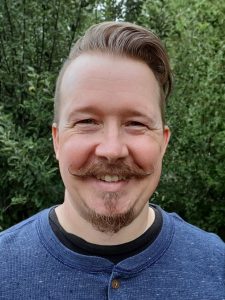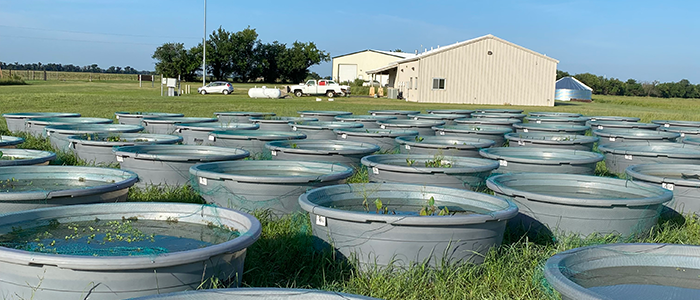
While we tend to think of college students as young adults fresh out of high school, many students do not fit this mold. In fact, most do not. Three-quarters of college students are older than 25, balancing school with family life and work.
Justin Oettle from Goddard, Kansas, is one such student. As a senior at Wichita State University, he’s on track to graduate with a biology degree in 2022 and seek a new career—after nearly two decades since his first degree.
With support by the Kansas NSF EPSCoR, Justin got paid to do research in summer 2021 with Thomas Luhring, assistant professor of biological sciences at WSU. His project involved collecting and analyzing a slew of water samples to learn more about how various factors affect nutrients in aquatic systems.
Dr. Luhring said that Justin did an “outstanding job of handling a meticulous and monotonous data collection effort and working with a complex data set.” He was also excited to see Justin present the work at two conferences and has plans to publish the research in a scientific journal soon.
Here’s Justin’s story.

Where did you do your research?
We used a mesocosm system at a field station near Wichita.
Mesocosm? What is that?
It’s a controlled outdoor experiment with 64 cattle troughs set up in an 8 by 8 grid. Each trough, or tank, contains water along with soil from various ecosystems.
What is the focus of your research?
For my experiment, half of the tanks stayed full of water the whole time. The other half were dried out completely, then refilled with water to model what happens to streams after a drought. We then analyzed the nutrients dissolved in the water over time and with other types of treatments, like with added fish or frogs, or fish and frogs.
How did you sample so many tanks?
There were 17 different sampling days over 12 weeks. I took 2 samples of water each time, and then stabilized them so that they could be analyzed by our collaborator at Oklahoma State University.
What was one of your proudest moments?
When our collaborator said how clean our results were, I felt proud that I did the process correctly. It was nice to be part of something that produced really good results.
What attracted you to biology?
I’m a nontraditional student. I originally went to college to get a theatre degree and tried to make that work in California. But after some health issues and two children, my family and I moved back to Wichita. I’m getting older, so I looked at my options and interests, and decided to go for something that would lead to a degree with a lot of career options. I’ve always enjoyed science and nature, too.
How did you hear about the program?
Dr. Luhring told me about it, and at first, I didn’t think I could add it to my schedule. But he nudged me again, and so I applied. This was my first research project. It was nice to be chosen for it!
What comes next?
I am taking a two-week vertebrate zoology trip to Arizona with my mentor next summer. I would like to do graduate school, but I have to think about my finances. I am hoping to get into conservation biology and find a local job or internship.
